AND
-
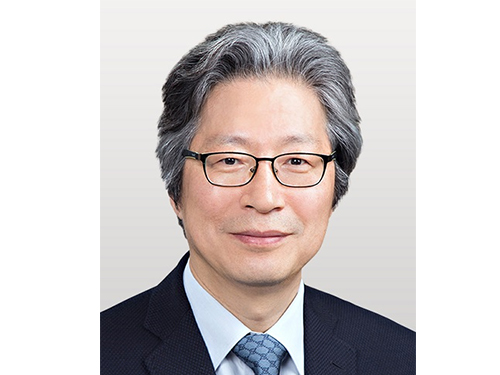 Professor Gou Young Koh, 2018 Laureate of Ho-Am Prize
Distinguished Professor Gou Young Koh from the Graduate School of Medical Science and Engineering was appointed a 2018 laureate in medicine of the Ho-Am Prize by the Ho-Am Foundation. Professor Koh is a renowned expert in the field of tumor angiogenesis by exploring the hidden nature of capillary and lymphatic vessels in human organs.
He was recognized for demonstrating the effective reduction of tumor progression and metastasis via tumor vessel normalization. This counterintuitive study result is regarded as a stepping stone for a drug discovery to prevent microvascular diseases.
Besides Professor Koh, Professor Hee Oh from Yale University (Science), Professor Nam-Gyu Park from Sungkyunkwan University (Engineering), Opera Singer Kwangchul Youn (The Arts) and Sister Carla Kang (Community Service) received awards.
The Ho-Am Prize is presented to individuals who have contributed to academics, the arts, and social development, or furthered the welfare of humanity, and commemorates the noble spirit of public service espoused by the late Chairman Byung-chull Lee, who used the pen name Ho-Am.
It was established in 1990 by Kun-Hee Lee, the chairman of Samsung. Awards have been presented to 143 individuals worth a total of 24.4 billion KRW.
2018.04.11 View 8350
Professor Gou Young Koh, 2018 Laureate of Ho-Am Prize
Distinguished Professor Gou Young Koh from the Graduate School of Medical Science and Engineering was appointed a 2018 laureate in medicine of the Ho-Am Prize by the Ho-Am Foundation. Professor Koh is a renowned expert in the field of tumor angiogenesis by exploring the hidden nature of capillary and lymphatic vessels in human organs.
He was recognized for demonstrating the effective reduction of tumor progression and metastasis via tumor vessel normalization. This counterintuitive study result is regarded as a stepping stone for a drug discovery to prevent microvascular diseases.
Besides Professor Koh, Professor Hee Oh from Yale University (Science), Professor Nam-Gyu Park from Sungkyunkwan University (Engineering), Opera Singer Kwangchul Youn (The Arts) and Sister Carla Kang (Community Service) received awards.
The Ho-Am Prize is presented to individuals who have contributed to academics, the arts, and social development, or furthered the welfare of humanity, and commemorates the noble spirit of public service espoused by the late Chairman Byung-chull Lee, who used the pen name Ho-Am.
It was established in 1990 by Kun-Hee Lee, the chairman of Samsung. Awards have been presented to 143 individuals worth a total of 24.4 billion KRW.
2018.04.11 View 8350 -
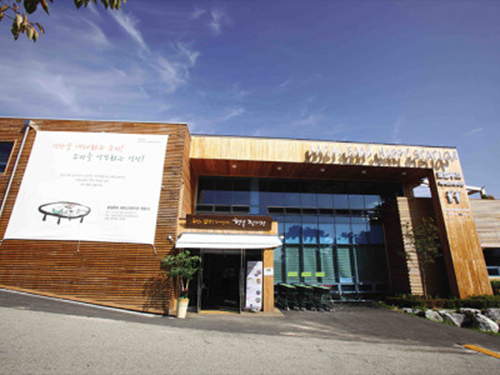 KAIST Develops IoT Platform for Food Safety
A research team led by the KAIST Auto-ID Labs developed a GS1 international standard-based IoTs infrastructure platform dubbed Oliot (Open Language of Internet of Things). This platform will be applied to Wanju Local Food, the nation’s largest cooperative, and will be in operation from April 5.
A total of eleven organizations participated in the development of Oliot, with KAIST as the center. This consortium is based on the GS1 international standard-based Oliot platform, which allows collecting and sharing data along the entire process of agrifood from production to processing, distribution, and consumption. It aims at increasing farm incomes and establishing a global ecosystem of domestic agriculture and stockbreeding that provides safe food.
Wanju Local Food is now the world’s first local food co-op with a traceability system from the initial stage of production planning to end sales based on GS1 international standards, which will ensure food safety.
KAIST has been sharing Oliot data in order to apply it to industries around the world. As of April 2018, approximately 900 enterprises and developers from more than 100 countries have downloaded it.
Professor Daeyoung Kim from the School of Computing, who is also Research Director of Auto-ID Labs said, “We are planning to disseminate Oliot to local food cooperatives throughout the nation. We will also cooperate with other countries, like China, Holland, and Hong Kong to create a better ecosystem for the global food industry.
“We are currently collaborating with related business to converge Oliot with AI or blockchain technology that can be applied to various services, such as healthcare and smart factories. Its tangible outcome will be revealed soon,” he added.
Auto-ID Labs are a global research consortium of six academic institutions that research and develop new technologies for advancing global commerce, partnering with GS1 (Global Standard 1), a non-profit organization that established standards for global commerce such as introducing barcodes to the retail industry. The Auto-ID Labs include MIT, University of Cambridge, Keio University, Fudan University, ETH Zurich/University of St. Gallen, and KAIST.
The consortium was supported by the Ministry of Science and ICT as well as the Institute for Information and Communications Technology Promotion for three years from 2015.
The launching of Oliot at Wanju Local Food will be held on April 5.
2018.04.03 View 9167
KAIST Develops IoT Platform for Food Safety
A research team led by the KAIST Auto-ID Labs developed a GS1 international standard-based IoTs infrastructure platform dubbed Oliot (Open Language of Internet of Things). This platform will be applied to Wanju Local Food, the nation’s largest cooperative, and will be in operation from April 5.
A total of eleven organizations participated in the development of Oliot, with KAIST as the center. This consortium is based on the GS1 international standard-based Oliot platform, which allows collecting and sharing data along the entire process of agrifood from production to processing, distribution, and consumption. It aims at increasing farm incomes and establishing a global ecosystem of domestic agriculture and stockbreeding that provides safe food.
Wanju Local Food is now the world’s first local food co-op with a traceability system from the initial stage of production planning to end sales based on GS1 international standards, which will ensure food safety.
KAIST has been sharing Oliot data in order to apply it to industries around the world. As of April 2018, approximately 900 enterprises and developers from more than 100 countries have downloaded it.
Professor Daeyoung Kim from the School of Computing, who is also Research Director of Auto-ID Labs said, “We are planning to disseminate Oliot to local food cooperatives throughout the nation. We will also cooperate with other countries, like China, Holland, and Hong Kong to create a better ecosystem for the global food industry.
“We are currently collaborating with related business to converge Oliot with AI or blockchain technology that can be applied to various services, such as healthcare and smart factories. Its tangible outcome will be revealed soon,” he added.
Auto-ID Labs are a global research consortium of six academic institutions that research and develop new technologies for advancing global commerce, partnering with GS1 (Global Standard 1), a non-profit organization that established standards for global commerce such as introducing barcodes to the retail industry. The Auto-ID Labs include MIT, University of Cambridge, Keio University, Fudan University, ETH Zurich/University of St. Gallen, and KAIST.
The consortium was supported by the Ministry of Science and ICT as well as the Institute for Information and Communications Technology Promotion for three years from 2015.
The launching of Oliot at Wanju Local Food will be held on April 5.
2018.04.03 View 9167 -
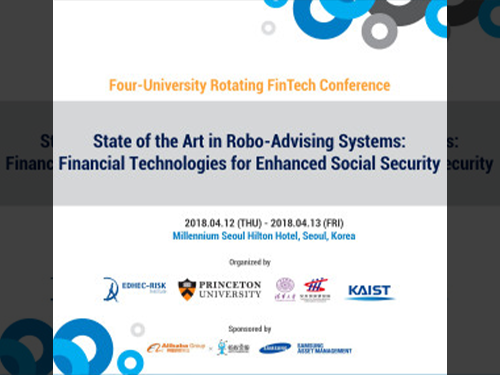 KAIST to Host FinTech Conference 2018
KAIST will be hosting a FinTech Conference with Princeton University (USA), Tsinghua University (China), and EDHEC Business School (France) in Seoul from April 12 to 13 titled State of the Art in Robo-Advising Systems: Financial Technologies for Enhanced Social Security.
The Bendhein Center for Finance and Department of Operations Research and Financial Engineering from Princeton University, Fintech Lab from Tsinghua University, and the Risk Institute from EDHEC will participate as co-hosting organizations in this conference organized by the Department of Industrial & Systems Engineering and the KAIST Center for Wealth Management Technologies.
The conference will discuss issues required for providing customized asset management to the public in terms of theory, technology, and industry.
During the conference, KAIST President Sung-Chul Shin and Chairman and CEO of the National Pension Service Sung Joo Kim will deliver welcoming addresses.
Professor John Mulvey from Princeton University, Professor Michael Dempster from Cambridge University, Professors Wei Xu and Changle Lin from Tsinghua University, Professor Lionel Martellini from EDHEC, and Professor Woo Chang Kim from KAIST are some of the invited speakers at the event.
Moreover, renowned experts in related fields will also participate in the conference, including Founder of Vanguard Group John Bogle, Jin Lee from Ant Financial, Youngsuh Cho from Shinhan Financial Group, Jung-Hwan Lee from Samsung Asset Management, and Hye Young Sung from the National Pension Service Research Institute.
Professor Kim said, “Only a small number of wealthy people can receive life-cycle customized asset management services due to the high cost structure; however, new technology derived from the Fourth Industrial Revolution can reduce the service price in an innovative manner, ultimately leading it to be popularized.”
“In an era with the poverty rate of older people reaching almost 50%.Fintech can enable individuals to manage their assets in an active manner, reinforcing social security without additional social costs in the period,” he added.
These four universities have been hosting the FinTech Conference since 2017. China will host the conference this fall, followed by France next year.
Samsung Asset Management, Alibaba Group, and Ant Financial will sponsor the conference. Anyone interested in this event can find more details at http://wmt.kaist.ac.kr/conference.html.
2018.04.02 View 8170
KAIST to Host FinTech Conference 2018
KAIST will be hosting a FinTech Conference with Princeton University (USA), Tsinghua University (China), and EDHEC Business School (France) in Seoul from April 12 to 13 titled State of the Art in Robo-Advising Systems: Financial Technologies for Enhanced Social Security.
The Bendhein Center for Finance and Department of Operations Research and Financial Engineering from Princeton University, Fintech Lab from Tsinghua University, and the Risk Institute from EDHEC will participate as co-hosting organizations in this conference organized by the Department of Industrial & Systems Engineering and the KAIST Center for Wealth Management Technologies.
The conference will discuss issues required for providing customized asset management to the public in terms of theory, technology, and industry.
During the conference, KAIST President Sung-Chul Shin and Chairman and CEO of the National Pension Service Sung Joo Kim will deliver welcoming addresses.
Professor John Mulvey from Princeton University, Professor Michael Dempster from Cambridge University, Professors Wei Xu and Changle Lin from Tsinghua University, Professor Lionel Martellini from EDHEC, and Professor Woo Chang Kim from KAIST are some of the invited speakers at the event.
Moreover, renowned experts in related fields will also participate in the conference, including Founder of Vanguard Group John Bogle, Jin Lee from Ant Financial, Youngsuh Cho from Shinhan Financial Group, Jung-Hwan Lee from Samsung Asset Management, and Hye Young Sung from the National Pension Service Research Institute.
Professor Kim said, “Only a small number of wealthy people can receive life-cycle customized asset management services due to the high cost structure; however, new technology derived from the Fourth Industrial Revolution can reduce the service price in an innovative manner, ultimately leading it to be popularized.”
“In an era with the poverty rate of older people reaching almost 50%.Fintech can enable individuals to manage their assets in an active manner, reinforcing social security without additional social costs in the period,” he added.
These four universities have been hosting the FinTech Conference since 2017. China will host the conference this fall, followed by France next year.
Samsung Asset Management, Alibaba Group, and Ant Financial will sponsor the conference. Anyone interested in this event can find more details at http://wmt.kaist.ac.kr/conference.html.
2018.04.02 View 8170 -
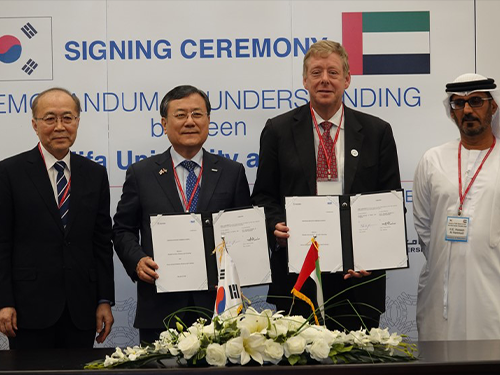 KAIST-KU Sign MOU on 4th Industrial Technology Development
(President Shin(second from left) poses with Khalifa University President Tod Laursen after signing an MOU in the UAE on March 25. Far left is Chairman of the NST Kwangyun Wohn and far right is the UAE Minister of Educatiion Hussain Al Hammadi.)
KAIST President Sung-Chul Shin and Khalifa University Interim President Tod Laursen signed an MOU on the Fourth Industrial Technology Development on March 25 in the UAE.
They signed the MOU during the UAE-ROK Nuclear Friendship and KAIST Alumni Night at Khalifa University co-hosted by KAIST and the Korea Atomic Energy Research Institute (KAERI). The MOU will bring new opportunities to further expand bilateral cooperation in education and training in the relevant technologies called for the era of the Fourth Industrial Revolution.
More than 100 dignitaries including Chairman of National Research Council of Science and Technology (NST) in Korea Dr. Kwangyun Wohn, President of KAERI Jaejoo Ha, the UAE Minister of Education His Excellency Hussain Al Hammadi, Minister of State for Advanced Sciences Her Excellency Sarah bint Yousef Al Amiri, and His Excellency Federal Authority for Nuclear Regulation (FANR) Director General Christopher Viktorsson attended the event. In particular, a significant number of Emirati graduates of the KUSTAR-KAIST education program and many others who completed various KAIST training programs joined the event.
The Nuclear Friendship Night was celebrating the completion of the first nuclear power plant in Barakah exported by Korea. This is the first nuclear reactor in the Middle East, which is to start operation later this year. The event also coincided with Korean President Moon Jae-In’s state visit to the UAE.
KAIST and KAERI gathered distinguished leaders from the higher education and nuclear industries at the event in response to the UAE government’s top national agenda of fostering future talents and promoting the nuclear industry in order to ensure energy security.
KAIST and Khalifa University signed an initial agreement in education and research in 2009 when the governments of Korea and the UAE signed a contract to build four nuclear power plants in Barakah. Since then, the two universities have worked together closely in the areas of nuclear engineering, bio-medical engineering, robotics, mechanical engineering, chemical engineering, and materials science. With this signing on the new MOU, the partnership between the two institutions will mark the second phase of educating high-caliber human resources in science and technology of the two countries.
The KAIST Alumni Night also brought more opportunities to appreciate the achievements that the two countries have made through collaboration in education and research, mostly represented in the field of nuclear technology between KAIST and Khalifa University. During the event, KAIST graduates also shared their experiences from the education at KAIST, followed by the welcoming speeches from the UAE Minister of Education and the UAE Minister of State for Advanced Sciences.
KAIST President Shin, in his welcoming speech at the event, said, “I look forward to more students in the UAE having the opportunity to experience the world’s top-level education and global environment that KAIST offers. The collaboration with Khalifa University and the UAE is very important for building both countries’ future growth.”
KU President Laursen said, “This MOU on research cooperation focusing on technologies for the Fourth Industrial Revolution, nuclear engineering, and other technical areas will further consolidate our partnership with KAIST and support us in developing human capital suitable to take on future challenges in the science and technology sectors. We firmly believe the talent pool of experts created by this initiative will contribute to the overall economic growth of the UAE.”
2018.03.26 View 9986
KAIST-KU Sign MOU on 4th Industrial Technology Development
(President Shin(second from left) poses with Khalifa University President Tod Laursen after signing an MOU in the UAE on March 25. Far left is Chairman of the NST Kwangyun Wohn and far right is the UAE Minister of Educatiion Hussain Al Hammadi.)
KAIST President Sung-Chul Shin and Khalifa University Interim President Tod Laursen signed an MOU on the Fourth Industrial Technology Development on March 25 in the UAE.
They signed the MOU during the UAE-ROK Nuclear Friendship and KAIST Alumni Night at Khalifa University co-hosted by KAIST and the Korea Atomic Energy Research Institute (KAERI). The MOU will bring new opportunities to further expand bilateral cooperation in education and training in the relevant technologies called for the era of the Fourth Industrial Revolution.
More than 100 dignitaries including Chairman of National Research Council of Science and Technology (NST) in Korea Dr. Kwangyun Wohn, President of KAERI Jaejoo Ha, the UAE Minister of Education His Excellency Hussain Al Hammadi, Minister of State for Advanced Sciences Her Excellency Sarah bint Yousef Al Amiri, and His Excellency Federal Authority for Nuclear Regulation (FANR) Director General Christopher Viktorsson attended the event. In particular, a significant number of Emirati graduates of the KUSTAR-KAIST education program and many others who completed various KAIST training programs joined the event.
The Nuclear Friendship Night was celebrating the completion of the first nuclear power plant in Barakah exported by Korea. This is the first nuclear reactor in the Middle East, which is to start operation later this year. The event also coincided with Korean President Moon Jae-In’s state visit to the UAE.
KAIST and KAERI gathered distinguished leaders from the higher education and nuclear industries at the event in response to the UAE government’s top national agenda of fostering future talents and promoting the nuclear industry in order to ensure energy security.
KAIST and Khalifa University signed an initial agreement in education and research in 2009 when the governments of Korea and the UAE signed a contract to build four nuclear power plants in Barakah. Since then, the two universities have worked together closely in the areas of nuclear engineering, bio-medical engineering, robotics, mechanical engineering, chemical engineering, and materials science. With this signing on the new MOU, the partnership between the two institutions will mark the second phase of educating high-caliber human resources in science and technology of the two countries.
The KAIST Alumni Night also brought more opportunities to appreciate the achievements that the two countries have made through collaboration in education and research, mostly represented in the field of nuclear technology between KAIST and Khalifa University. During the event, KAIST graduates also shared their experiences from the education at KAIST, followed by the welcoming speeches from the UAE Minister of Education and the UAE Minister of State for Advanced Sciences.
KAIST President Shin, in his welcoming speech at the event, said, “I look forward to more students in the UAE having the opportunity to experience the world’s top-level education and global environment that KAIST offers. The collaboration with Khalifa University and the UAE is very important for building both countries’ future growth.”
KU President Laursen said, “This MOU on research cooperation focusing on technologies for the Fourth Industrial Revolution, nuclear engineering, and other technical areas will further consolidate our partnership with KAIST and support us in developing human capital suitable to take on future challenges in the science and technology sectors. We firmly believe the talent pool of experts created by this initiative will contribute to the overall economic growth of the UAE.”
2018.03.26 View 9986 -
 Open Online Course in Science and Technology, STAR-MOOC
Four universities specializing in science and technology, along with POSTECH and UST, teamed up to establish programs for innovation in education programs, responding to the Fourth Industrial Revolution.
KAIST held an opening ceremony for the Science & Technology Advanced Research - Massive Open Online Course (STAR-MOOC) and signed an MoU with GIST, DGIST, UNIST, POSTECH, and UST.
STAR-MOOC was launched on February 26 to provide educational service to the public. It is a joint platform where people can take courses featuring lectures from professors from universities specializing in science and technology as well as national research universities.
It offers 15 courses covering basics, majors, and electives related to science and technology developed by the STAR-MOOC committee. Students can take a variety of courses.
At the opening ceremony, KAIST President Sung-Chul Shin, DGIST President Sang Hyuk Son, UST President Kil Choo Moon, POSTECH Vice President Wankyun Chung, UNIST Vice President Jae Sung Lee, GIST Vice President of Public Affairs Pil-hwan Park came to sign the MoU for provising educational services for the public.
During the ceremony, there was also time to introduce a technical agreement with a non-profit organization founded by NAVER, the CONNECT Foundation, for its courses and platform.
Universities participating in STAR-MOOC will put effort into capacity building in response to changes driven by the Fourth Industrial Revolution.
President Shin said, “STAR-MOOC is a platform that provides science and technology courses from basics to electives and major courses. It will become a leading educational platform.”
Students can register and choose courses from the website (http://starmooc.kr).
2018.03.19 View 8536
Open Online Course in Science and Technology, STAR-MOOC
Four universities specializing in science and technology, along with POSTECH and UST, teamed up to establish programs for innovation in education programs, responding to the Fourth Industrial Revolution.
KAIST held an opening ceremony for the Science & Technology Advanced Research - Massive Open Online Course (STAR-MOOC) and signed an MoU with GIST, DGIST, UNIST, POSTECH, and UST.
STAR-MOOC was launched on February 26 to provide educational service to the public. It is a joint platform where people can take courses featuring lectures from professors from universities specializing in science and technology as well as national research universities.
It offers 15 courses covering basics, majors, and electives related to science and technology developed by the STAR-MOOC committee. Students can take a variety of courses.
At the opening ceremony, KAIST President Sung-Chul Shin, DGIST President Sang Hyuk Son, UST President Kil Choo Moon, POSTECH Vice President Wankyun Chung, UNIST Vice President Jae Sung Lee, GIST Vice President of Public Affairs Pil-hwan Park came to sign the MoU for provising educational services for the public.
During the ceremony, there was also time to introduce a technical agreement with a non-profit organization founded by NAVER, the CONNECT Foundation, for its courses and platform.
Universities participating in STAR-MOOC will put effort into capacity building in response to changes driven by the Fourth Industrial Revolution.
President Shin said, “STAR-MOOC is a platform that provides science and technology courses from basics to electives and major courses. It will become a leading educational platform.”
Students can register and choose courses from the website (http://starmooc.kr).
2018.03.19 View 8536 -
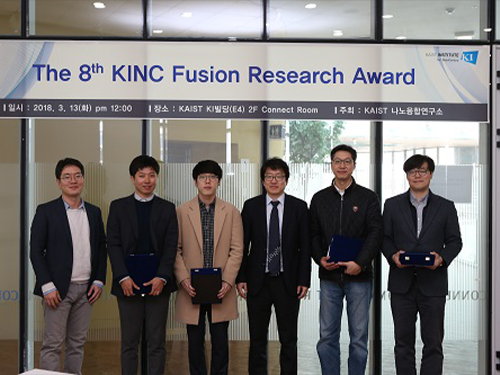 The 8th KINC Fusion Research Awardees
The KAIST Institute for NanoCentury held the 8th KINC Fusion Research Award in order to encourage professors’ convergence studies and instill students’ willingness to research. The award ceremony took place in the KI Building at KAIST on March 13.
The KINC Fusion Research Award selects the most outstanding convergence studies among research undertaken last year, and awards researchers who participated in that research.
The 8th KINC Fusion Research Award went to Professor Yoon Sung Nam from the Department of Materials Science and Engineering and Professor Inkyu Park from the Department of Mechanical Engineering. Their research reported the spontaneous self-biomineralization of palladium (Pd) ions on a filamentous virus to form ligand-free Pd nanowires without reducing reagents or using additional surface stabilizers (Title: Virus-Templated Self-Mineralization of Ligand-Free Colloidal Palladium Nanostructures for High Surface Activity and Stability, Advanced Functional Materials (2017)).
Professor Hee-Tae Jung, the Director of KAIST Institute for the NanoCentury and the host of the KINC Fusion Research Award said, “Convergence will be the crucial keyword that will lead to revolutionary change. Hence, the importance of convergence study should be improved. We will put every effort into creating a research environment for increasing convergence study.
The KAIST Institute for the NanoCentury was established in June 2006 under the KAIST Institute with a mission of creating convergence study by tearing down boarders among departments and carrying out interdisciplinary joint research. Currently, approximately 90 professors from 14 departments participate the institute. It aims to become a hub of university institutes for nano-fusion research.
2018.03.19 View 12192
The 8th KINC Fusion Research Awardees
The KAIST Institute for NanoCentury held the 8th KINC Fusion Research Award in order to encourage professors’ convergence studies and instill students’ willingness to research. The award ceremony took place in the KI Building at KAIST on March 13.
The KINC Fusion Research Award selects the most outstanding convergence studies among research undertaken last year, and awards researchers who participated in that research.
The 8th KINC Fusion Research Award went to Professor Yoon Sung Nam from the Department of Materials Science and Engineering and Professor Inkyu Park from the Department of Mechanical Engineering. Their research reported the spontaneous self-biomineralization of palladium (Pd) ions on a filamentous virus to form ligand-free Pd nanowires without reducing reagents or using additional surface stabilizers (Title: Virus-Templated Self-Mineralization of Ligand-Free Colloidal Palladium Nanostructures for High Surface Activity and Stability, Advanced Functional Materials (2017)).
Professor Hee-Tae Jung, the Director of KAIST Institute for the NanoCentury and the host of the KINC Fusion Research Award said, “Convergence will be the crucial keyword that will lead to revolutionary change. Hence, the importance of convergence study should be improved. We will put every effort into creating a research environment for increasing convergence study.
The KAIST Institute for the NanoCentury was established in June 2006 under the KAIST Institute with a mission of creating convergence study by tearing down boarders among departments and carrying out interdisciplinary joint research. Currently, approximately 90 professors from 14 departments participate the institute. It aims to become a hub of university institutes for nano-fusion research.
2018.03.19 View 12192 -
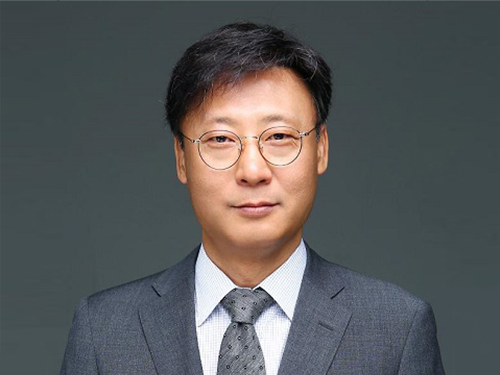 Scientist of March, Professor Hee-Seung Lee
(Professor Hee-Seung Lee)
Professor Hee-Seung Lee from the Department of Chemistry at KAIST received the ‘Science and Technology Award of the Month’ awarded by the Ministry of ICT and Science, and the National Research Foundation of Korea for March 2018.
Professor Lee has been recognized for successfully producing peptide-based molecular machines, which used to be made of metals.
The methodology can be translated into magnetotactic behavior at the macroscopic scale, which is reminiscent of magnetosomes in magnetotactic bacteria.
The team employed foldectures, self-assembled molecular architectures of β-peptide foldamers, to develop the peptide-based molecular machines that uniformly align with respect to an applied static magnetic field.
Professor Lee said, “Molecular machines are widely used in the field of medical engineering or material science; however, there were limitations for developing the machines using magnetic fields. By developing peptide-based molecular machines, we were able to develop body-friendly molecular machines.”
Every month, the Ministry of ICT and Science and the National Research Foundation of Korea award a cash prize worth 10,000,000 KRW to a scientist who has contributed to science and technology with outstanding research and development performance.
2018.03.15 View 9272
Scientist of March, Professor Hee-Seung Lee
(Professor Hee-Seung Lee)
Professor Hee-Seung Lee from the Department of Chemistry at KAIST received the ‘Science and Technology Award of the Month’ awarded by the Ministry of ICT and Science, and the National Research Foundation of Korea for March 2018.
Professor Lee has been recognized for successfully producing peptide-based molecular machines, which used to be made of metals.
The methodology can be translated into magnetotactic behavior at the macroscopic scale, which is reminiscent of magnetosomes in magnetotactic bacteria.
The team employed foldectures, self-assembled molecular architectures of β-peptide foldamers, to develop the peptide-based molecular machines that uniformly align with respect to an applied static magnetic field.
Professor Lee said, “Molecular machines are widely used in the field of medical engineering or material science; however, there were limitations for developing the machines using magnetic fields. By developing peptide-based molecular machines, we were able to develop body-friendly molecular machines.”
Every month, the Ministry of ICT and Science and the National Research Foundation of Korea award a cash prize worth 10,000,000 KRW to a scientist who has contributed to science and technology with outstanding research and development performance.
2018.03.15 View 9272 -
 Seong-Tae Kim Wins Robert-Wagner All-Conference Best Paper Award
(Ph.D. candidate Seong-Tae Kim)
Ph.D. candidate Seong-Tae Kim from the School of Electrical Engineering won the Robert Wagner All-Conference Best Student Paper Award during the 2018 International Society for Optics and Photonics (SPIE) Medical Imaging Conference, which was held in Houston last month.
Kim, supervised by Professor Yong Man Ro, received the award for his paper in the category of computer-aided diagnosis. His paper, titled “ICADx: Interpretable Computer-Aided Diagnosis of Breast Masses”, was selected as the best paper out of 900 submissions. The conference selects the best paper in nine different categories. His research provides new insights on diagnostic technology to detect breast cancer powered by deep learning.
2018.03.15 View 10351
Seong-Tae Kim Wins Robert-Wagner All-Conference Best Paper Award
(Ph.D. candidate Seong-Tae Kim)
Ph.D. candidate Seong-Tae Kim from the School of Electrical Engineering won the Robert Wagner All-Conference Best Student Paper Award during the 2018 International Society for Optics and Photonics (SPIE) Medical Imaging Conference, which was held in Houston last month.
Kim, supervised by Professor Yong Man Ro, received the award for his paper in the category of computer-aided diagnosis. His paper, titled “ICADx: Interpretable Computer-Aided Diagnosis of Breast Masses”, was selected as the best paper out of 900 submissions. The conference selects the best paper in nine different categories. His research provides new insights on diagnostic technology to detect breast cancer powered by deep learning.
2018.03.15 View 10351 -
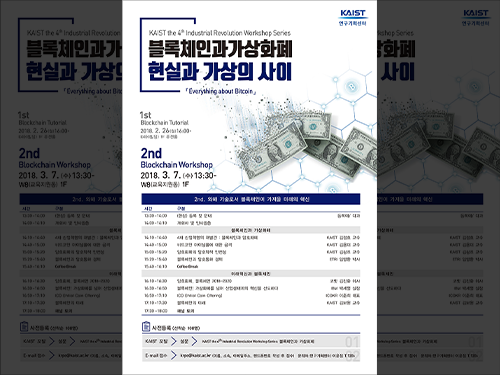 Blockchain and Cryptocurrency: Between Reality and Virtuality
A workshop on blockchain and cryptocurrency, one of the 4th Industrial Revolution Workshop Series, was held at the KAIST main campus on March 7.
Experts from industry, academia, and research gathered and shared their opinions about blockchain technology, which is currently gaining huge attention along with cryptocurrency.
During the workshop, four KAIST professors and four experts from institutes and business examined the scope on the possibility of blockchain, technology for the Fourth Industrial Revolution.
Moreover, they discussed a variety of issues including mining, wallets, cryptocurrency, information security, smart contracts, and ICOs.
In a previous blockchain tutorial, Professor Yongdae Kim from the School of Electrical Engineering at KAIST and Professor Hyoungshick Kim from Sungkyunkwan University opened up a blockchain tutorial which provided a technical understanding of blockchain, such as the birth of cryptocurrency, algorithm design, and exchange methods.
Professor Jungho Kim, who is in charge of this event, said, “This workshop will broaden the understanding of blockchain, which can provide a foundation for a national growth engine.”
2018.03.07 View 7730
Blockchain and Cryptocurrency: Between Reality and Virtuality
A workshop on blockchain and cryptocurrency, one of the 4th Industrial Revolution Workshop Series, was held at the KAIST main campus on March 7.
Experts from industry, academia, and research gathered and shared their opinions about blockchain technology, which is currently gaining huge attention along with cryptocurrency.
During the workshop, four KAIST professors and four experts from institutes and business examined the scope on the possibility of blockchain, technology for the Fourth Industrial Revolution.
Moreover, they discussed a variety of issues including mining, wallets, cryptocurrency, information security, smart contracts, and ICOs.
In a previous blockchain tutorial, Professor Yongdae Kim from the School of Electrical Engineering at KAIST and Professor Hyoungshick Kim from Sungkyunkwan University opened up a blockchain tutorial which provided a technical understanding of blockchain, such as the birth of cryptocurrency, algorithm design, and exchange methods.
Professor Jungho Kim, who is in charge of this event, said, “This workshop will broaden the understanding of blockchain, which can provide a foundation for a national growth engine.”
2018.03.07 View 7730 -
 KAIST Professors Selected as Y-KAST Members
Professor YongKeun Park, Professor Bumjoon Kim, Professor Keon Jae Lee, and Professor Young Seok Ju were selected as the newest members of the Young Korean Academy of Science and Technology (Y-KAST).
The Korean Academy of Science and Technology, an academic institution of professional experts, selected 26 promising scientists under the age of 43 to join Y-KAST. and four KAIST professors were included in the list.
The newest members were conferred on February 26.
Research Field
Name
Natural Sciences
YongKeun Park (Dept. of Physics)
Engineering
Bumjoon Kim (Dept. of Chemical and Biomolecular Engineering)
Agricultural & Fishery Sciences
Keon Jae Lee (Dept. of Materials Science and Engineering)
Medical Sciences
Young Seok Ju (Graduate School of Medical Science and Engineering)
2018.03.05 View 9234
KAIST Professors Selected as Y-KAST Members
Professor YongKeun Park, Professor Bumjoon Kim, Professor Keon Jae Lee, and Professor Young Seok Ju were selected as the newest members of the Young Korean Academy of Science and Technology (Y-KAST).
The Korean Academy of Science and Technology, an academic institution of professional experts, selected 26 promising scientists under the age of 43 to join Y-KAST. and four KAIST professors were included in the list.
The newest members were conferred on February 26.
Research Field
Name
Natural Sciences
YongKeun Park (Dept. of Physics)
Engineering
Bumjoon Kim (Dept. of Chemical and Biomolecular Engineering)
Agricultural & Fishery Sciences
Keon Jae Lee (Dept. of Materials Science and Engineering)
Medical Sciences
Young Seok Ju (Graduate School of Medical Science and Engineering)
2018.03.05 View 9234 -
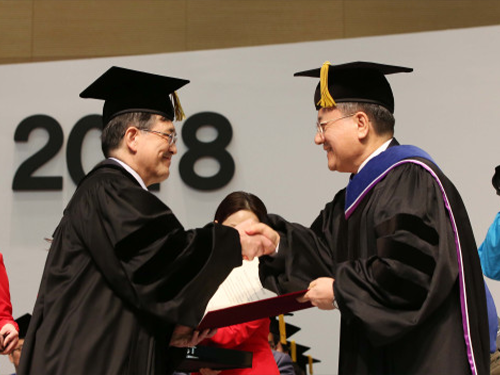 Samsung Electronics' Chairman Kwon Becomes the First Alumnus Honorary Doctorate
(Samsung Electronics' Chairman & CEO Kwon,left, and President Shin)
The semiconductor has bred innovation in Korea, as one of the staples of economic growth. Without the success of the semiconductor industry of Korea, it is hard to imagine the high tech dominance in the global market enjoyed by Korean companies.
It is said that one in every four Ph.D.s working in the semiconductor industry of Korea graduated from KAIST. Among them, Chairman and CEO Oh-Hyun Kwon of Samsung Electronics, Class of 1977, has arrived at the epitome of this top industry.
KAIST’s class of 1977 produced many movers and shakers in Korea’s innovation efforts. Now in their mid-60s, they were the players who embodied Korea’s ICT and helped it become a global powerhouse. They are the ones who worked for and witnessed the socio-economic transformation of Korea through innovation.
In recognition of his unsurpassable entrepreneurship, which made the remarkable strides in the semiconductor and electronics industry in Korea and beyond, Chairman Kwon was honored as the first recipient of an honorary doctorate from his alma mater on February 23 during the 2018 commencement ceremony.
After completing his Master's in Electrical Engineering at KAIST in 1977, he earned his Ph.D. in Electrical Engineering from Stanford University. The first honorary degree bestowed to an alumnus was conferred by the first alumnus President of KAIST Sung-Chul Shin. President Shin said that Chairman Kwon’s exceptional leadership has inspired the KAIST community and exemplified the spirit of KAIST.
Currently serving as chairman & CEO of Samsung Electronics and Samsung Advanced Institute of Technology (SAIT), Kwon has worked for Samsung in a variety of key positions in their semiconductor division since 1985.
In the mid-1980s, Japan was leading the global semiconductor market. At Samsung, Chairman Kwon, who was in charge of the memory semiconductor team, successfully developed 4M DRAM. Later in 1992, he played a leading role in the development of the world’s first 64M DRAM.
The success of 4M DRAM and 64M DRAM led Samsung to clinch the top position in the DRAM and NAND flash business around the world. This helped Samsung emerge as a global leader in the semiconductor industry.
As a result, Samsung, as well as the national economy, could gain significant momentum to build national competitiveness and economic growth. The outstanding technological leadership of Chairman Kwon led to the development of proprietary semiconductor design and processes technologies as well as numerous patents.
He also played a leadership role in creating a mutual growth environment among conglomerates rather than merely engaging in direct competition. Chairman Kwon made every effort to establish the cornerstone of mutual growth, especially in relationships with small and medium-sized enterprises (SMEs). His win-win collaboration initiatives among conglomerates and SMEs made a significant impact on the development of the entire industry of Korea.
In his acceptance speech, he charged the graduates to embrace challenges, to collaborate with peers, and create their own future.
The full text of his speech is printed below.
Graduates and distinguished guests! I extend my sincere congratulations to my fellow graduates, as you are awarded degrees for your deep efforts, as well as to the parents and family members who have supported you.
In 1977, I received my Master’s degree in Electrical Engineering from KAIST. Today, as the first honorary doctor among KAIST graduates, I am truly honored to be here. I am deeply grateful to all of you, including President Sung-Chul Shin and the Chairman of the Board of Trustees, Jang-Moo Lee.
Today, I want to tell you about the experiences and lessons I have learned from my 40 years of corporate management experience.
First, you should lead and drive changes by yourself. In the process of realizing a dream, the situation and circumstances do not always proceed as you planned.
I started my career as a researcher. However, I had to continuously transform myself into a project leader, business team leader, and CEO. It was challenging every time, due to a lack of preparing and my insufficient ability. However, I have always accomplished the intended goal through the mindset of embracing changes and studying new things.
It is said that the survivors are not always the strongest nor the most intelligent, but the ones who are the most adaptive to changes. We can only be the last survivor if we have the character to see those small signs that signal changes are coming and cope with changes well. Take changes positively and actively and then, transform yourself to match a given situation.
In addition, it is important to understand others. When it comes to one’s career, there is nothing that you can do alone without the assistance of others. If it is not possible to do everything by yourself, you will need to supplement your efforts through the help of others. To do this, you need to understand your colleagues, bosses, and customers first.
People, who work in tech tend to cage themselves in their own silos. But in an era of destructive innovation, where boundaries of industries and technologies are collapsing at a breakneck pace, scientists also need to enhance their understanding of various areas such as culture, art, and the humanities.
This is a famous verse from a poem by Chun-Soo Kim.
Before I called his name,
He was nothing but a gesture.
When I called his name, He came to me and became a flower.
Make wonderful synergy by making your partner a flower and complementing each other. When you first notice the true value of another person and interact with them, the value of the individual will be doubled and will bring about a greater impact.
Finally, we all need to cooperate with each other. All of you here, including myself, are people who have benefited from society. We must cooperate with each other and give back to society for the best results.
A biologist once said that incremental evolution comes from competition, but fundamental evolution comes from cooperation. Great leaders should achieve results through cooperation rather than competition.
You are the future leaders with top-class knowledge. I hope you will become great leaders who have wisdom that combines external resources with your abilities.
Now, graduates of 2018 who are standing at the starting line, we often worry about an unpredictable tomorrow. However, the smartest way to predict the future is to create the future for ourselves. Moreover, we can try again even though we sometimes make mistakes. I urge you to make future you are hoping for.
Once again, I would like to thank you for this honorary doctorate and extend my sincere wishes for the endless development of KAIST and the best of luck to the futures of these graduates. Thank you.
2018.02.26 View 8024
Samsung Electronics' Chairman Kwon Becomes the First Alumnus Honorary Doctorate
(Samsung Electronics' Chairman & CEO Kwon,left, and President Shin)
The semiconductor has bred innovation in Korea, as one of the staples of economic growth. Without the success of the semiconductor industry of Korea, it is hard to imagine the high tech dominance in the global market enjoyed by Korean companies.
It is said that one in every four Ph.D.s working in the semiconductor industry of Korea graduated from KAIST. Among them, Chairman and CEO Oh-Hyun Kwon of Samsung Electronics, Class of 1977, has arrived at the epitome of this top industry.
KAIST’s class of 1977 produced many movers and shakers in Korea’s innovation efforts. Now in their mid-60s, they were the players who embodied Korea’s ICT and helped it become a global powerhouse. They are the ones who worked for and witnessed the socio-economic transformation of Korea through innovation.
In recognition of his unsurpassable entrepreneurship, which made the remarkable strides in the semiconductor and electronics industry in Korea and beyond, Chairman Kwon was honored as the first recipient of an honorary doctorate from his alma mater on February 23 during the 2018 commencement ceremony.
After completing his Master's in Electrical Engineering at KAIST in 1977, he earned his Ph.D. in Electrical Engineering from Stanford University. The first honorary degree bestowed to an alumnus was conferred by the first alumnus President of KAIST Sung-Chul Shin. President Shin said that Chairman Kwon’s exceptional leadership has inspired the KAIST community and exemplified the spirit of KAIST.
Currently serving as chairman & CEO of Samsung Electronics and Samsung Advanced Institute of Technology (SAIT), Kwon has worked for Samsung in a variety of key positions in their semiconductor division since 1985.
In the mid-1980s, Japan was leading the global semiconductor market. At Samsung, Chairman Kwon, who was in charge of the memory semiconductor team, successfully developed 4M DRAM. Later in 1992, he played a leading role in the development of the world’s first 64M DRAM.
The success of 4M DRAM and 64M DRAM led Samsung to clinch the top position in the DRAM and NAND flash business around the world. This helped Samsung emerge as a global leader in the semiconductor industry.
As a result, Samsung, as well as the national economy, could gain significant momentum to build national competitiveness and economic growth. The outstanding technological leadership of Chairman Kwon led to the development of proprietary semiconductor design and processes technologies as well as numerous patents.
He also played a leadership role in creating a mutual growth environment among conglomerates rather than merely engaging in direct competition. Chairman Kwon made every effort to establish the cornerstone of mutual growth, especially in relationships with small and medium-sized enterprises (SMEs). His win-win collaboration initiatives among conglomerates and SMEs made a significant impact on the development of the entire industry of Korea.
In his acceptance speech, he charged the graduates to embrace challenges, to collaborate with peers, and create their own future.
The full text of his speech is printed below.
Graduates and distinguished guests! I extend my sincere congratulations to my fellow graduates, as you are awarded degrees for your deep efforts, as well as to the parents and family members who have supported you.
In 1977, I received my Master’s degree in Electrical Engineering from KAIST. Today, as the first honorary doctor among KAIST graduates, I am truly honored to be here. I am deeply grateful to all of you, including President Sung-Chul Shin and the Chairman of the Board of Trustees, Jang-Moo Lee.
Today, I want to tell you about the experiences and lessons I have learned from my 40 years of corporate management experience.
First, you should lead and drive changes by yourself. In the process of realizing a dream, the situation and circumstances do not always proceed as you planned.
I started my career as a researcher. However, I had to continuously transform myself into a project leader, business team leader, and CEO. It was challenging every time, due to a lack of preparing and my insufficient ability. However, I have always accomplished the intended goal through the mindset of embracing changes and studying new things.
It is said that the survivors are not always the strongest nor the most intelligent, but the ones who are the most adaptive to changes. We can only be the last survivor if we have the character to see those small signs that signal changes are coming and cope with changes well. Take changes positively and actively and then, transform yourself to match a given situation.
In addition, it is important to understand others. When it comes to one’s career, there is nothing that you can do alone without the assistance of others. If it is not possible to do everything by yourself, you will need to supplement your efforts through the help of others. To do this, you need to understand your colleagues, bosses, and customers first.
People, who work in tech tend to cage themselves in their own silos. But in an era of destructive innovation, where boundaries of industries and technologies are collapsing at a breakneck pace, scientists also need to enhance their understanding of various areas such as culture, art, and the humanities.
This is a famous verse from a poem by Chun-Soo Kim.
Before I called his name,
He was nothing but a gesture.
When I called his name, He came to me and became a flower.
Make wonderful synergy by making your partner a flower and complementing each other. When you first notice the true value of another person and interact with them, the value of the individual will be doubled and will bring about a greater impact.
Finally, we all need to cooperate with each other. All of you here, including myself, are people who have benefited from society. We must cooperate with each other and give back to society for the best results.
A biologist once said that incremental evolution comes from competition, but fundamental evolution comes from cooperation. Great leaders should achieve results through cooperation rather than competition.
You are the future leaders with top-class knowledge. I hope you will become great leaders who have wisdom that combines external resources with your abilities.
Now, graduates of 2018 who are standing at the starting line, we often worry about an unpredictable tomorrow. However, the smartest way to predict the future is to create the future for ourselves. Moreover, we can try again even though we sometimes make mistakes. I urge you to make future you are hoping for.
Once again, I would like to thank you for this honorary doctorate and extend my sincere wishes for the endless development of KAIST and the best of luck to the futures of these graduates. Thank you.
2018.02.26 View 8024 -
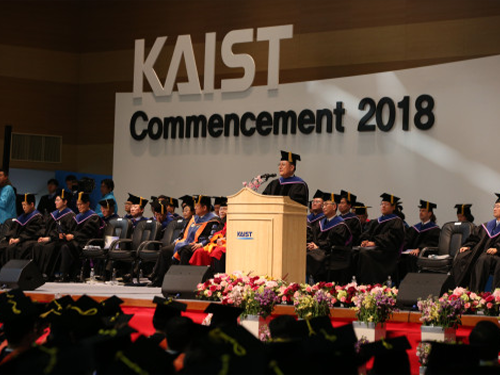 The 2018 Commencement of KAIST at a Glance
KAIST awarded a total of 2, 736 degrees at the 2018 commencement ceremony on February 23. Among the honorees, Chairman and CEO of Samsung Electronics and Samsung Advanced Institute of Technology (SAIT) Oh-Hyun Kwon was recognized as the first alumnus honorary doctorate recipient of KAIST.
More than 5,000 family, friends, and graduates including distinguished guests of Minister of Science and ICT Young-Min Yu, the Member of National Assembly Kyung-Jin Kim, Chairman of the KAIST Board of Trustees Jang-Moo Lee, and the Chairperson of the KAIST Development Foundation Soo-Young Lee attended to celebrate the graduates. During the commencement, a total of 2,736 students earned degrees: 644 PhD degrees, 1,352 master’s degrees, and 740 bachelor’s degrees.
(Minister of Science and ICT Young-Min Yu)
(The Member of National Assembly Kyung-Jin Kim)
This year, Chairman and CEO of Samsung Electronics and SAIT Kwon shared the spotlight with many other graduates. Kwon received his Master’s degree in Electrical Engineering from KAIST in 1977 and completed his Ph.D. in Electrical Engineering from Stanford University in 1985. During his more than 33-year career at Samsung, he has made significant contribution to the development of 4M DRAM and the world’s first 64M DRAM. The success of 4M DRAM and 64 DRAM led Samsung to clinch the top position in the DRAM and NAND flash business around the world. This helped Samsung emerge as a global leader in the semiconductor industry.
(From left: Chairman and CEO of Samsung Electronics and SAIT Oh-Hyun Kwon and KAIST President Sung-Chul Shin)
During the commencement speech, Kwon and President Shin both highlighted the importance of collaboration instead of competition.
Kwon encouraged the graduates to understand others to make wonderful synergy. “When you first notice the true value of another person and interact with them, the value of the individual will be doubled and will bring about a greater impact,” he said.
Also, he stressed having a collaborative mindset by saying, “All of you here, including myself, are people who have benefited from society. We must cooperate with each other and give back to society for the vest results.”
While highlighting the core values of KAIST, creativity, challenge and caring, President Shin also emphasized collaboration with others. He said, “In the future, expertise in a single discipline will not lead to new inventions or discoveries. This highlights the importance of multidisciplinary, convergence research. The key to success lies in the acknowledgement of your peers as partners for mutual growth. Your partners will make up your weak areas and become your most important asset. May you expand your personal network by finding valuable partners not only within your laboratory and workplace, but beyond Korea.”
“Go out into the world and change it as a global shaper, global innovator, and global mover. I hope that each and every one of you will add benefits the world and your legacy will be remembered for generations to come. This is your obligation as a graduate of KAIST,” he said.
Click here to view the full text of President Sung-Chul Shin’s address to the graduates
+ List of academically outstanding undergraduate degree recipients who received honors during the Commencement 2018 of KAIST
Award
Department
Winner
Minister of Science and ICT Award
Dept. of Mathematical Sciences
Seong-Hyeok Park
KAIST Board Chairperson Award
School of Computing
Hyeong-Seok Kim
KAIST President Award
Dept. of Chemistry
Hoi-Min Cheong
KAIST Development Foundation Chairperson Award
Dept. of Biological Sciences
Gi-Song Kim
Dept. of Industrial & Systems Engineering
Seung-Hun Lee
2018.02.23 View 11361
The 2018 Commencement of KAIST at a Glance
KAIST awarded a total of 2, 736 degrees at the 2018 commencement ceremony on February 23. Among the honorees, Chairman and CEO of Samsung Electronics and Samsung Advanced Institute of Technology (SAIT) Oh-Hyun Kwon was recognized as the first alumnus honorary doctorate recipient of KAIST.
More than 5,000 family, friends, and graduates including distinguished guests of Minister of Science and ICT Young-Min Yu, the Member of National Assembly Kyung-Jin Kim, Chairman of the KAIST Board of Trustees Jang-Moo Lee, and the Chairperson of the KAIST Development Foundation Soo-Young Lee attended to celebrate the graduates. During the commencement, a total of 2,736 students earned degrees: 644 PhD degrees, 1,352 master’s degrees, and 740 bachelor’s degrees.
(Minister of Science and ICT Young-Min Yu)
(The Member of National Assembly Kyung-Jin Kim)
This year, Chairman and CEO of Samsung Electronics and SAIT Kwon shared the spotlight with many other graduates. Kwon received his Master’s degree in Electrical Engineering from KAIST in 1977 and completed his Ph.D. in Electrical Engineering from Stanford University in 1985. During his more than 33-year career at Samsung, he has made significant contribution to the development of 4M DRAM and the world’s first 64M DRAM. The success of 4M DRAM and 64 DRAM led Samsung to clinch the top position in the DRAM and NAND flash business around the world. This helped Samsung emerge as a global leader in the semiconductor industry.
(From left: Chairman and CEO of Samsung Electronics and SAIT Oh-Hyun Kwon and KAIST President Sung-Chul Shin)
During the commencement speech, Kwon and President Shin both highlighted the importance of collaboration instead of competition.
Kwon encouraged the graduates to understand others to make wonderful synergy. “When you first notice the true value of another person and interact with them, the value of the individual will be doubled and will bring about a greater impact,” he said.
Also, he stressed having a collaborative mindset by saying, “All of you here, including myself, are people who have benefited from society. We must cooperate with each other and give back to society for the vest results.”
While highlighting the core values of KAIST, creativity, challenge and caring, President Shin also emphasized collaboration with others. He said, “In the future, expertise in a single discipline will not lead to new inventions or discoveries. This highlights the importance of multidisciplinary, convergence research. The key to success lies in the acknowledgement of your peers as partners for mutual growth. Your partners will make up your weak areas and become your most important asset. May you expand your personal network by finding valuable partners not only within your laboratory and workplace, but beyond Korea.”
“Go out into the world and change it as a global shaper, global innovator, and global mover. I hope that each and every one of you will add benefits the world and your legacy will be remembered for generations to come. This is your obligation as a graduate of KAIST,” he said.
Click here to view the full text of President Sung-Chul Shin’s address to the graduates
+ List of academically outstanding undergraduate degree recipients who received honors during the Commencement 2018 of KAIST
Award
Department
Winner
Minister of Science and ICT Award
Dept. of Mathematical Sciences
Seong-Hyeok Park
KAIST Board Chairperson Award
School of Computing
Hyeong-Seok Kim
KAIST President Award
Dept. of Chemistry
Hoi-Min Cheong
KAIST Development Foundation Chairperson Award
Dept. of Biological Sciences
Gi-Song Kim
Dept. of Industrial & Systems Engineering
Seung-Hun Lee
2018.02.23 View 11361